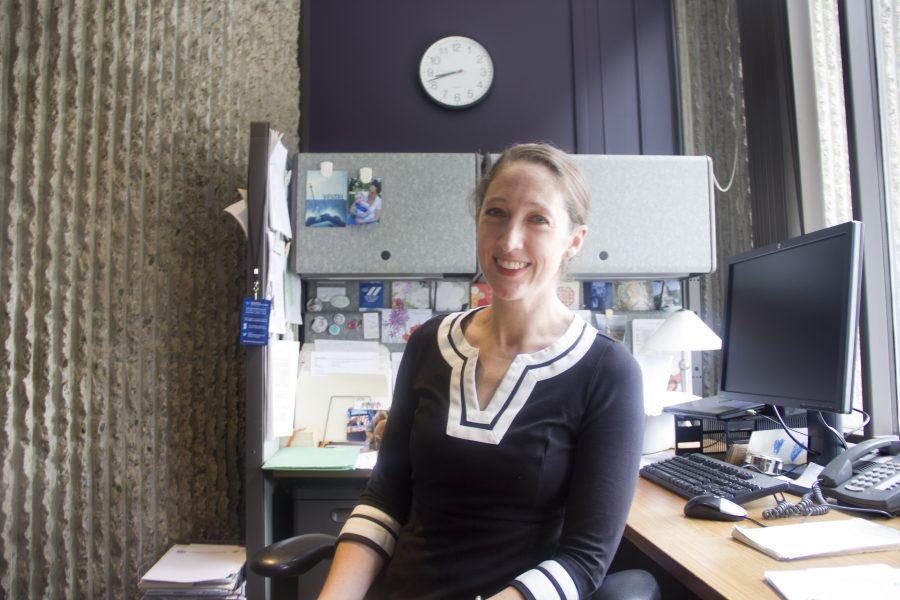Massachusetts was the first state in the nation to legislate The Equal Pay Act in 1945 before it was largely accepted in the country and was named The Equal Pay Act of 1963. This year, Massachusetts is building off the tradition in its progressive efforts to close the wage gap between men and women in the state. On July 1, 2016, The Equal Pay Bill was legislated in Massachusetts, a law intended to reconstruct The Equal Pay Act of 1963. One of the contributors in legislation of the bill is Jill Ashton.
Ashton is a graduate of the Program for Women in Politics and Public Policy of the McCormack School at the University of Massachusetts Boston. She is now the Director of the Massachusetts Commission on the Status of Women. This organization started as one of three founding organizations of what was only then the Equal Pay Coalition.
Ashton sat in her office on an early Tuesday morning to speak with the Mass Media about her role and the purpose of the recent bill.
Ashton: The Coalition grew to forty members. The Coalition and I served as the Chair. That was my official role in advocating on behalf of the Equal Pay Bill.
Mass Media: There is this question of whether the Equal Pay Bill will completely close the wage disparity between men and women. What would you say to that?
Ashton: We know that the wage gap [exists] due to a number of factors. There are strategies and tools that can be used to address some of those factors. And then there are a number of other factors that are more challenging to address. And so, the goal of the Equal Pay Bill was to develop good policy that would be able to implement in an effective way that would address a few of those factors and that would move us to closing the wage gap in Massachusetts.
Mass Media: And according to the Equal Pay Bill, the legislation requires employers to shy away from the question, “how much did you make at your previous job?” Would you say that banning that question is the core purpose of this legislation?
Ashton: The legislation, indeed, bans the employer from asking about salary history before an offer is made. What this legislation does is encourage employers to [conduct] an internal audit that is not disclosed outside of the organization. A key component of the legislation is safe harbor provision, which means that if a discrimination suit is brought, they [employers] have the means to mind their data and make adjustments that was perhaps caused by unconscious bias. After the legislation takes into effect in July 2018, hiring managers can no longer say, “So what did you make in your previous job?” Otherwise, what the question does is perpetuate wage discrimination.
Mass Media: So would you say that the mentality behind legislating this bill was the attempt to eliminate discrimination?
Ashton: The legislation, this is my perspective, has three main components, the first is clarifying the definition of what constitutes comparable work. So MA passed the first legislation to have an Equal Pay Act (1945) and it said that persons should be compensated if they were doing comparable work. However, it did not define what constitutes comparable work. And perhaps, clarifying that definition was the [motivation]. Ultimately what we did is retain that definition but then we built on that.
Mass Media: How did this project come to be? What exactly motivated the decision to reconstruct a bill that hasn’t been directly addressed in a considerable number of years?
Ashton: The Equal Pay Coalition was the first project that my team led on. I started a conversation in 2014. The legislation from start to finish continued to surprise me. It’s been exciting to see when the Commission makes a decision to lead on this issue, we’re able to not only see the legislation pass in a single session, which never happens, but we were able to see it done with a majority built in the House and in the Senate and signed by a Republican Governor. With this community support.
Mass Media: So for young ambitious women who want to lead successful paths what advice would you give them? And coming from a well-established figure who graduated from UMass Boston, what advice would you give especially to the UMass community?
Ashton: One tremendous piece of advice I got from a woman at Planned Parenthood that I worked with said, “What do you want? what do you want to do? Where do you wanna be? And how much do you wanna make?” And that question immediately made me feel uncomfortable. You know, I’m a New Englander and we don’t talk about money. But I said, “Well, it’s really important that I do a job that I feel proud of.” I immediately started to say, “Umm.” And she stopped me and said, “The work that you do is important and you should be compensated for it.” Do not undervalue yourself. More importantly, if you ever have a moment where you are undervaluing yourself, think about how you would never undervalue your work. If that’s important, you’re important.
According to Ashton, The Equal Pay Bill by and large is a symbol of continuous progress. It is important to note, however, that policy can never eliminate discrimination. But what is particularly important is evaluating our laws to understand how policy can be improved and, in the long-term, contribute to create a more equitable society.
The Massachusetts Equal Pay Coalition in particular reaches out with its progressive values to contribute to a bigger picture; a better society despite disagreements in political standing. The Equal Pay Coalition has succeeded to legislate the Equal Pay Bill through our Republican Governor. And the organization is working to strengthen its partnership with its partners such as, the Fair Employment Project, the Justice Resource Institute, and Mass Alliance.
For further inquiries visit; http://www.maequalpaycoalition.com/





















































